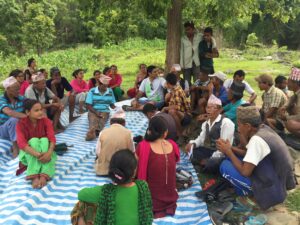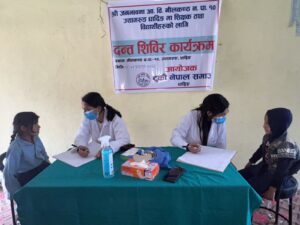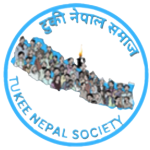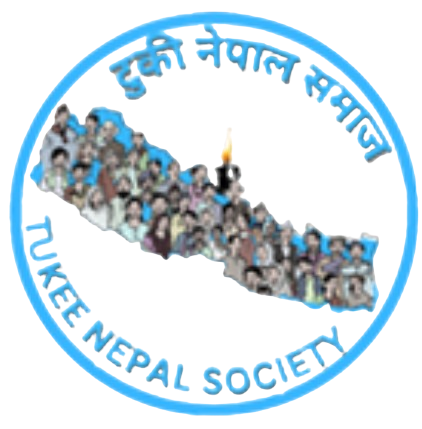Volunteers
 Volunteers can choose from a variety of opportunities to make a difference in Nepal: teaching English at schools or in a library, working in a hospital or community development projects. According to the volunteer’s desire, experience and education we try to find an appropriate placement where they can exchange their knowledge and learn about Nepali life. It’s possible to choose to either stay in the city (Kathmandu) or in a remote village which is about 6 hours drive from Kathmandu.
Volunteers can choose from a variety of opportunities to make a difference in Nepal: teaching English at schools or in a library, working in a hospital or community development projects. According to the volunteer’s desire, experience and education we try to find an appropriate placement where they can exchange their knowledge and learn about Nepali life. It’s possible to choose to either stay in the city (Kathmandu) or in a remote village which is about 6 hours drive from Kathmandu.
Programs
Teaching at school or in a library
Volunteers will teach at the local primary and secondary school (10 am to 4 pm) for six days a week (Friday is only a half day and Saturday is off). Due to the language barrier the main focus will be on teaching English rather than common subjects as maths or science. They can also work additionally in the library before\after school or during school holidays. The activities include for example arranging games, singing and other creative education to keep the children entertained. There is no specific qualification required for English teaching projects other than that volunteers speak the language fluently and that they have a passion for working with children aged 6 to 16. To bring enthusiasm, patience and an understanding for a different culture are important attributes to make the stay memorable. In rural areas it is an advantage to know some Nepali basics.
If volunteers prefer to stay in the city they can teach from primary school up to college.

Health & Medical Center
Medical volunteers in Nepal work in the rural medical center in the village or in the hospital in Kathmandu, mostly as an assistant to the main doctor. Work responsibilities depend on education, skill and experience. For this program, medical students, medical doctors or nurses are preferred, however, volunteers with basic experience can also be placed.
Projects could include: health checks, the creation of medical records, health and sanitation education and treating basic ailments. Volunteers with first aid training can also provide real benefits to the local community. They can teach the locals about health, sanitation and first aid knowledge.
We have one health center in a rural village where we are in particular looking for a doctor that can support the local staff. At the moment only health assistants and a midwife are working there.
Community development projects/Working in agricultural fields
This is an opportunity to stay with a local host family and help in their daily house work and also on the fields. In agriculture the volunteer will be actively involved in planting, harvesting, feeding the animals, learning to cook and other aspects of fieldwork. The community development projects are an opportunity to help in a wide range of practical village-based projects. Those can be as basic as painting, however, volunteers with additional skills may be able to help in more advanced work. Projects are usually decided after consultation with the local community but volunteers can suggest own ideas. They work together with the villagers and/or other volunteers, learning the traditional methods of building. Example projects include school repair and decoration, toilet building, drinking water projects or recycling projects.
Starting date:
Any date (custom-made)
Volunteers live with a traditional family nearby their placement. They get the opportunity to learn about all aspects of Nepali life, including culture, food and people. Volunteers become a member of the household and can participate in activities like cooking or washing if they wish to. The family serves the typical Nepali dish of Dal Bhat (rice with lentils) two times a day plus a snack in the afternoon. Life in the village is simply with limited access to water or electricity, but it’s the best and most authentic way to experience real Nepal. Most families have a simple toilet and tap or stream water to wash. Every volunteer gets its own, but very basic room.
In Kathmandu it’s also possible to stay in a hotel instead of a host family. The costs for the hotel are not included in the program fee, therefore every volunteer can decide himself\herself which kind of standard he\she wants.
For the medical placement at the hospital in Kathmandu it is an extra 80 USD per week
2 weeks is EUR 250
3 weeks is EUR 350
4 weeks is EUR 450
6 weeks is EUR 550
8 weeks is EUR 700
10 weeks is EUR 800
12 weeks is EUR 900
16 weeks is EUR 1’100
20 weeks is EUR 1’300
What is included in the price:
Airport pick up\drop from Kathmandu Airport
Transport to and from the village placement to Kathmandu
Accommodation and main meals during placement with local family
Accommodation, food, Nepali Language classes, sightseeing and cultural information classes during the training in Kathmandu
24 hours support
Not included in the price:
Air tickets
Visa fee
Insurance
Personal expenses (Internet, laundry, telephone and bar bills)
Trekking, Jungle Safari and Rafting
Sleeping Bag
Hiking boots
Tevas/ flip flops
Fleece jacket (during winter months)
Light-weight cotton clothing
Waterproof jacket (a fold-away windcheater is fine)
(Women) Sarong (or you can buy a lungi cheaply in Nepal)
Mosquito repellent
Sun cream
Water purification tablets and/or good quality water purifier
First aid kit
Flashlight (torch)
Penknife
Books about your country
Photos of your family / friends / home (essential!)
Souvenirs for your family and staff from your country
A few examples of your local currency
Music CDs
Basic Learner’s English/Nepali/English dictionary for simple definitions (buy a Nepali dictionary on arrival in Kathmandu)
Magazines
Coloured pencils and pens, drawing books, stickers
Books on teaching English/English Grammar for your reference
Although officially no immunization is required to enter Nepal, volunteers should consult a doctor at home for the latest recommendations regarding vaccines. As a guide only, the following vaccinations should be considered for Nepal:
Diphtheria
Tetanus
Hepatitis A and B
Rabies
Japanese Encephalitis
Typhoid
Yellow fever
Polio
Malaria (tablets)
Volunteers should plan their vaccinations in advance, as many require more than one injection. It’s also recommended to bring a small first aid kit and personal medication including prescription.

